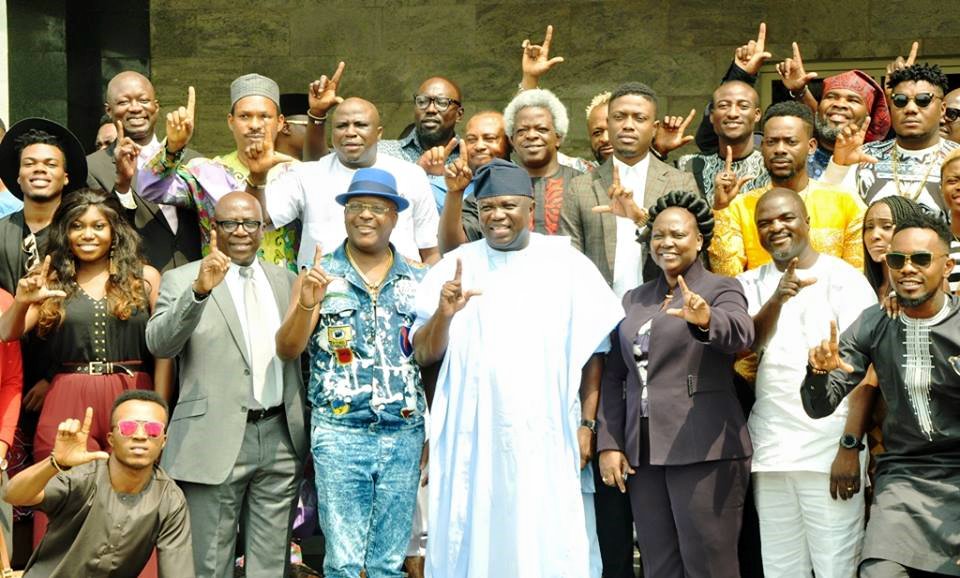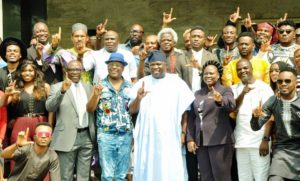Economy
Lagos to Boost GDP Through Entertainment


By Modupe Gbadeyanka
Governor Akinwunmi Ambode of Lagos State on Tuesday revealed plans of his administration to leverage on the vast economic opportunities in entertainment, tourism and arts sectors, among others to grow the Gross Domestic Product (GDP) of the state and promote talents in the state to compete globally.
Speaking at Lagos House, Ikeja when he received artistes who performed at the One Lagos Fiesta (OLF), who were on a thank-you-visit, Governor Ambode said the creative industry remains a veritable platform to grow the economy, and that government would tap into it and use it to positively engage the bulging youths in the state.
The OLF, which is an annual end of the year revue put together by the state government, held simultaneously in five different locations across the state from December 24, 2016 to January 1, 2017, and it was adjudged to be very successful with participation of A-list artistes from different genres of music.
The Governor, who thanked the artistes for their partnership with the state government, said the OLF was a platform put together by his administration to majorly create awareness about the potentials inherent in the entertainment industry, especially in using it to grow the economy and positively develop talents that abound in the country.
He said according to statistics, the State recorded the lowest crime rate during the period of the OLF, saying that the artists contributed significantly in keeping the city secured and scale up the international rating of the state as a safe place.
He recalled the Project T.H.E.S.E (Tourism, Hospitality, Entertainment, Sports for Excellence) which was part of campaign promises to Lagosians, saying that his administration remained committed to using the initiative as well as the OLF to grow the economy of the state.
“We have a bulging youth population dynamics in Lagos. 66 per cent of our population are below the age of 35 and if two third are of below 35, it means there is an economy in that age bracket that government is not seeing. The OLF was used to test run how to bring people together.
“The issue now is beyond OLF, how do we now take that opportunity to become a catalyst for this partnership? On my part, I want to reiterate my commitment. This is an area I love which is underutilized for the societal development of the country.
“Government is now willing to use your industry to grow its GDP because so far entertainers are working, we would have more visitors coming to Lagos; they will stay in our hotels; they will buy clothes; they will go out in the night and buy our drinks and the ultimate thing is that more taxes come in for the state.
“So, there is a concentric cycle around the energy of entertainers and so what I want is a structured framework.
“What is it that we should do as government to grow the industry? Why should we go and be doing video shoot in South Africa for instance? I want a win-win partnership not just to use artistes and dump them till another December. I want a year-round partnership that is built around a framework,” Mr Ambode told his guests.
Going forward, the Governor tasked artistes to come up with a structured framework to grow the economy, while government will provide infrastructures and initiatives to help the sector.
“The challenge for our artistes now is to come up with a framework of how government can intervene. We are willing to support and we are willing to draw up a programme to support you but how do you want to fuse into that to make Lagos the entertainment hub in Africa? That is the challenge but I want to thank you for honouring us,” the Governor said.
Many of the big names in the entertainment industry including Queen Salawa Abeni, Adewale Ayuba, Tiwa Savage, Adekunle Gold, Sir Shina Peters, Sound Sultan among others, lauded Governor Ambode for the OLF initiative and his commitment to grow the industry.
Other notable names who were part of the delegation included Folarin Falana (Falz), M.I Abaga, Patoranking, Obesere, Tony Tetuila, Dr Sid, Idris Abdulkareem, Aramide, CDQ, Sulaimon ‘Atawewe’ Adio, Reekado Banks, Humblesmith, Dammy Krane among others.
Economy
Nigeria’s Economy Expands 4.07% in Q4 2025

By Adedapo Adesanya
Nigeria’s economy, measured by gross domestic product (GDP), grew by 4.07 per cent (year-on-year) in real terms in the fourth quarter (Q4) of 2025.
The National Bureau of Statistics (NBS) announced the development in its latest GDP report for Q4 2025 on Friday.
The latest figure represents an improvement over the 3.76 per cent growth recorded in the corresponding period of 2024, signalling sustained recovery across key sectors of the economy. The growth rate was faster than the third quarter’s 3.98 per cent.
The report confirmed that Nigeria’s oil sector grew 6.79 per cent year-on-year and the non-oil part of the economy expanded by 3.99 per cent.
Nigeria’s average daily oil production stood at 1.58 million barrels per day in the final three months of 2025. That was lower than the third quarter’s output of 1.64 million barrels per day but higher than the 1.54 million barrels per day in the fourth quarter of 2024.
Breakdown of the data showed that the agriculture sector grew by 4.00 per cent in the fourth quarter of 2025. This marks a significant increase compared to the 2.54 per cent growth recorded in the same quarter of 2024, reflecting improved output and resilience in the sector.
The industry sector also recorded a stronger performance during the period under review. It grew by 3.88 per cent year-on-year, up from 2.49 per cent posted in the fourth quarter of 2024. The improvement suggests enhanced activity in manufacturing, construction, and related industrial sub-sectors.
The services sector maintained its position as a major growth driver, expanding by 4.15 per cent in Q4 2025. However, this was slightly lower than the 4.75 per cent growth recorded in the corresponding quarter of the previous year.
Overall, the 4.07 per cent GDP growth in the final quarter of 2025 underscores broad-based expansion across agriculture, industry, and services, despite a marginal moderation in services growth.
The Q4 performance provides further evidence of strengthening economic momentum, with improvements recorded in both agriculture and industry compared to the previous year.
Economy
Flour Mills Supports 2026 Paris International Agricultural Show

By Modupe Gbadeyanka
For the second time, Flour Mills of Nigeria Plc is sponsoring the Paris International Agricultural Show (PIAS) as part of its strategies to fortify its ties with France.
The 2026 PIAS kicked off on February 21 and will end on March 1, with about 607,503 visitors, nearly 4,000 animals, and over 1,000 exhibitors in attendance last year, and this year’s programme has already shown signs of being bigger and better.
The theme for this year’s event is Generations Solution. It is to foster knowledge transfer from younger generations and structure processes through which knowledge can be harnessed to drive technological advancement within the global agricultural sector.
In his address on the inaugural day of the Nigerian Pavilion on February 23, the Managing Director for FMN Agro and Director of Strategic Engagement/Stakeholder Relations, Mr Sadiq Usman, said, “At FMN, our mission is Feeding and Enriching Lives Every Day.
“This is a mandate we have fulfilled through decades of economic shifts, rooted in a culture of deep resilience and constant innovation. We support this pavilion because FMN recognises that the next frontier of global Agribusiness lies in high-level technical exchange.
“We thank the France-Nigeria Business Council (FNBC), the organisers of the PIAS, and our fellow members of the Nigerian Pavilion – Dangote, BUA, Zenith, Access, and our partners at Creativo El Matador and Soilless Farm Lab— we are exceedingly pleased to work to showcase the true face of Nigerian commerce.”
Speaking on the invaluable nature of the relationship between Nigeria and France, and the FMN’s commitment to process and product innovation, Mr John G. Coumantaros, stated, “The France – Nigeria relationship is a valuable partnership built on a shared value agenda that fosters remarkable Intercontinental trade growth.
“Also, as an organisation with over six decades of transformational footprint in Nigeria and progressively across the African Continent, FMN has been unwaveringly committed to product and process innovation.
“Therefore, our continuous partnership with France for the success of the Paris International Agricultural Show further buttresses the thriving relationship between both countries.”
PIAS is one of the most widely attended agricultural shows, with thousands of people from across the world in attendance.
Economy
NEITI Backs Tinubu’s Executive Order 9 on Oil Revenue Remittances

By Adedapo Adesanya
Despite reservations from some quarters, the Nigeria Extractive Industries Transparency Initiative (NEITI) has praised President Bola Tinubu’s Executive Order 9, which mandates direct remittances of all government revenues from tax oil, profit oil, profit gas, and royalty oil under Production Sharing Contracts, profit sharing, and risk service contracts straight to the Federation Account.
Issued on February 13, 2026, the order aims to safeguard oil and gas revenues, curb wasteful spending, and eliminate leakages by requiring operators to pay all entitlements directly into the federation account.
NEITI executive secretary, Musa Sarkin Adar, called it “a bold step in ongoing fiscal reforms to improve financial transparency, strengthen accountability, and mobilise resources for citizens’ development,” noting that the directive aligns with Section 162 of Nigeria’s Constitution.
He noted that for 20 years, NEITI has pushed for all government revenues to flow into the Federation Account transparently, calling the move a win.
For instance, in its 2017 report titled Unremitted Funds, Economic Recovery and Oil Sector Reform, NEITI revealed that over $20 billion in due remittances had not reached the government, fueling fiscal woes and prompting high-level reforms.
Mr Adar described the order as a key milestone in Nigeria’s EITI implementation and urged amendments to align it with these reforms.
He affirmed NEITI’s role in the Petroleum Industry Act (PIA) and pledged close collaboration with stakeholders, anti-corruption bodies, and partners to sustain transparent management of Nigeria’s mineral resources.
Meanwhile, others like the Petroleum and Natural Gas Senior Staff Association of Nigeria (PENGASSAN) have kicked against the order, saying it poses a serious threat to the stability of the oil and gas industry, calling it a “direct attack” on the PIA.
Speaking at the union’s National Executive Council (NEC) meeting in Abuja on Tuesday, PENGASSAN President, Mr Festus Osifo, said provisions of the order, particularly the directive to remit 30 per cent of profit oil from Production Sharing Contracts (PSCs) directly to the Federation Account, could destabilise operations at the Nigerian National Petroleum Company (NNPC) Limited.
Mr Osifo firmly dispelled rumours of imminent protests by the union, despite widespread claims that the controversial executive order threatens the livelihoods of 10,000 senior staff workers at NNPC.
He noted, however, that the union had begun engagements with government officials, including the Presidential Implementation Committee, and expressed optimism that common ground would be reached.
Mr Osifo, who also serves as President of the Trade Union Congress (TUC), expressed concerns that diverting the 30 per cent profit oil allocation to the Federation Account Allocation Committee (FAAC), without clearly defining how the statutory management fee would be refunded to NNPC, could affect the salaries of hundreds of PENGASSAN members.
-

 Feature/OPED6 years ago
Feature/OPED6 years agoDavos was Different this year
-
Travel/Tourism10 years ago
Lagos Seals Western Lodge Hotel In Ikorodu
-

 Showbiz3 years ago
Showbiz3 years agoEstranged Lover Releases Videos of Empress Njamah Bathing
-

 Banking8 years ago
Banking8 years agoSort Codes of GTBank Branches in Nigeria
-

 Economy3 years ago
Economy3 years agoSubsidy Removal: CNG at N130 Per Litre Cheaper Than Petrol—IPMAN
-

 Banking3 years ago
Banking3 years agoSort Codes of UBA Branches in Nigeria
-

 Banking3 years ago
Banking3 years agoFirst Bank Announces Planned Downtime
-

 Sports3 years ago
Sports3 years agoHighest Paid Nigerian Footballer – How Much Do Nigerian Footballers Earn











